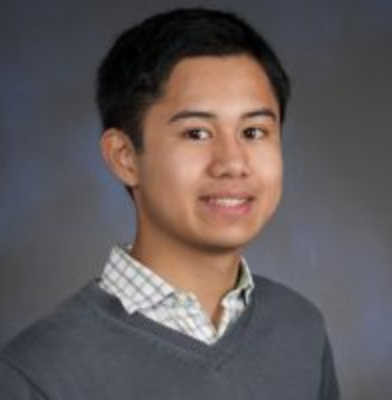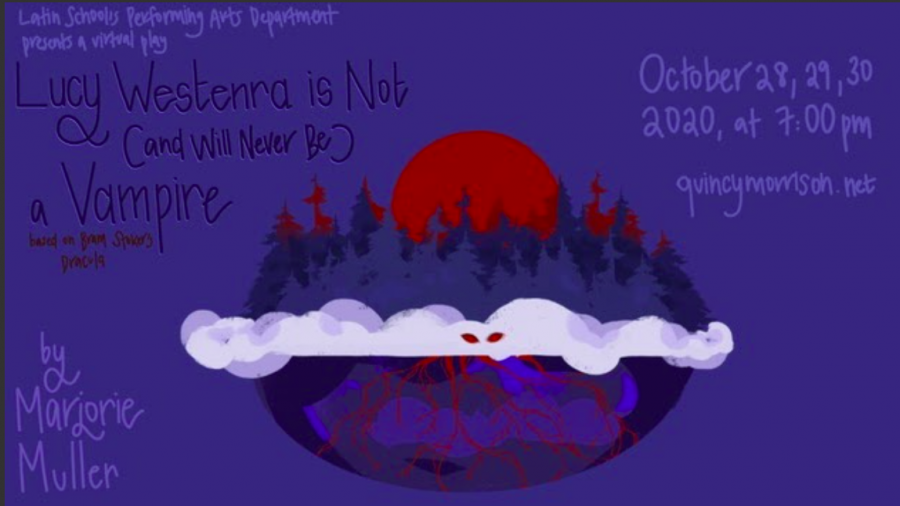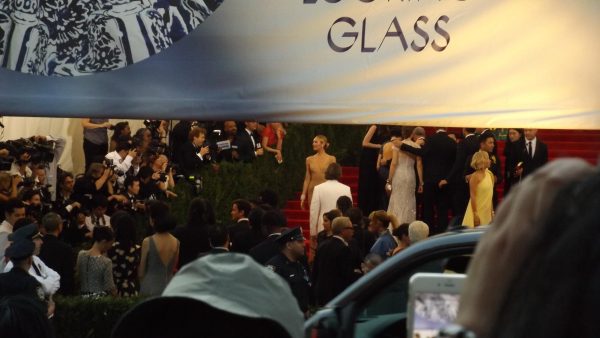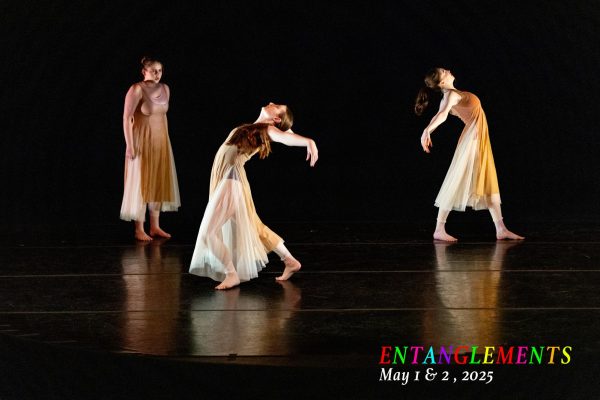Upper School presents world premiere of Zoom-based play
The poster for “Lucy Westerna Is Not (and Will Never Be) a Vampire,” Latin’s first play of its kind
At the end of October, the Upper School theater program virtually staged evening performances of Lucy Westenra is Not (and Will Never Be) a Vampire, on a website domain specially made for the play. This year’s fall production featured a cast of almost 20 students and relied on various other students and faculty for tech support, costume design, show-control programming, virtual background, and music, including junior Joey Gorman on the guitar. Playwright and Lower School teacher Marjorie Muller ‘13 wrote the script and composed the original music.
Drama teacher Frank Schneider, who directed the production, reached out to Ms. Muller and suggested adapting a familiar story for virtual format. “When I found out the play would have to be remote, I began to think about what that meant,” Mr. Schneider said. “How could we use the remote aspect as a part of the play, rather than just pretending that we were all in the same place? I have always wanted to do an adaptation of Dracula that was true to the novel, where the story is told in letters, journals, newspaper clipping, and such. And this seemed like the perfect time to do that.”
Presented with the option of either Romeo and Juliet or Dracula, Ms. Muller recounts that she “immediately said no to Romeo and Juliet” and purchased a copy of Bram Stoker’s classic gothic horror novel.
“I was immediately engrossed in the epistolary format—it lends itself to Zoom so easily,” Ms. Muller said. “But I didn’t want to just retell the story, full of all these dudes remarking on how chaste and smart the women around them are and trying to keep them from danger, weeping over their beauty.” Instead, she “tried to create a story with a feminist lens.”
“I wanted to flip the genders of Van Helsing and Seward,” Ms. Muller explained. “I noticed in all my reading about Dracula that Lucy’s portrayed as overly chaste and prudish or hyper promiscuous and crazed. I wanted to give her a voice that was more grounded, even if she was a vampire.”
From the play’s conception, Ms. Muller designed it specifically for Zoom. “I tried to make it as tech-focused as possible, even writing in for the final confrontation with Dracula some suggestions for how students could feign being in the same place (e.g., everyone in the dark with only flashlights). I knew whatever Mr. Hallstein and the stagecraft class did would be amazing, but I had no idea how jaw-dropping their work could possibly be in this format.”
“It was certainly a challenge, though,” Ms. Muller continued. “The thing about live theater that can’t be replicated in a digital form is that reciprocal energy you get between actors and the audience. I was concerned BAV wouldn’t be engaging without that element, but I was so wrong, and I definitely think that is owed to all the artists involved.”
Mr. Schneider said, “During runs of the show, I reacted, laughing especially, but the actors couldn’t hear me. They had to trust themselves and the work they had done. They had to trust that the audience was with them.”
Senior Hailey Hurd, who played Dr. Jacqueline “Jack” Seward, echoed Ms. Muller and Mr. Schneider’s thoughts. “Performing feels very different from behind a screen,” she said. “In a typical play, we’d be getting instant feedback and excitement from the audience, but with the virtual play we’ve had to look inward for that energy. It’s also difficult to act to a wall, and I’m very impressed by Jane, Damarian, and everyone else on the news team for making side-by-side scenes seem so realistic.”
Hailey added, “We’ve been really lucky to work with Marjorie Muller, a Latin alum who wrote the play specifically for our fall production. We’ve had a really cool view into the playwriting process as the script was being revised throughout the rehearsal process, and we were also able to converse with the playwright herself as the play was in development.”
“One of my favorite parts of the process is how all the students, designers, and faculty ended up informing BAV as it developed,” Ms. Muller said. “There’s something so refreshing and almost dangerous about playing with new work. Something that has never been performed before gets so influenced by the first artists who engage with it.”
The script went through at least seven drafts, and Ms. Muller revised the ending several times over. “Characters were cut, darlings were killed, and then I put it into Mr. Schneider’s hands.”
On the rehearsal process, Mr. Schneider said, “I tried to make it as close to an in-person experience as I could. Obviously we couldn’t be in the same physical space, but I tried to create a virtual space where we could connect.”
The virtual production also depended on extensive tech support. Mr. Schneider, stagecraft teacher Thad Hallstein, makerspace director Shane Enderle, and juniors Natalie Ruhana and Elliot Kovitz worked hard to ensure that the play ran smoothly. One of their jobs was troubleshooting Isadora, the live editing software used to create the audiovisual effects.
For the music as well, the play involved considerable collaboration among various students and teachers. After composing original music, Ms. Muller sent “rough voice memos of [her] singing and playing” to Mr. Schneider. “From there the incredibly talented guitarist, Joseph Gorman, made my simple chords come to life, and one of the cast members arranged harmonies.” She added that she “had nothing to do with the awesome incidental music created by the Music Technology class.”
Summing up the entire experience, Hailey said, “This is one of the most supportive casts I’ve ever been a part of, and I don’t know if that’s just the people, or if it’s because everyone has worked so hard to maintain the sense of community we’re missing while physically apart.”

Antonio Feliciano y Pleyto (‘21) is excited to serve as Arts Editor this year. He enjoys studying the classical guitar, bioinformatics, topics...





















































Julianna Jarik • Nov 20, 2020 at 6:59 pm
The Latin Theatre Department strikes again! It was so wonderful to see this play come together – from hearing Margie’s first ideas to the final performance. It was amazing to watch and an important reminder that the arts will always rise to any occasion. Congratulations to Margie, Mr. Schneider and the cast and crew of the show. This is something they will never forget.
Gabriel Di Gennaro • Nov 16, 2020 at 11:43 am
Thanks for covering the arts in this, Antonio! I appreciate that you included as many steps along the way as you did. It takes a village!